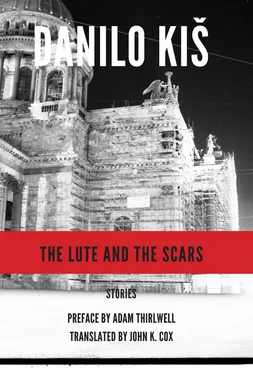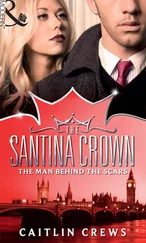“I knew it,” she said, leaving the room.
“No matter,” Nikolaj Aleksinski commented. “It’s better for you to have gone drinking with the actresses than to have roamed about Moscow. It really is better this way. For her not to find out.”
I realized it was obvious to him that I had carried out my assignment.
“Let’s have another glass,” he said. “Then I have to put the bottle away. Marija Nikolajevna is very sick.”
Postscript
In this piece, under the influence of Truman Capote, I attempted to approximate, in my own way, the genre of the “nonfictional story,” in which the role of imagination is reduced to a minimum and the facts are everything. In my story “Jurij Golec” I didn’t succeed in carrying out this intention: when a story’s characters, even ones of secondary importance, are specific people who are still alive, the writer is sometimes compelled to make costly adjustments and concessions with regard to amour-propre , something that is as understandable as it is human.
At dawn a notice had appeared near the power plant, on a wooden post.
It was autumn, the end of a wet and dreary October. The wind plucked the foliage from the poplars, in gusts. Leaves blew up and all around, like leaflets tossed from an airplane, and then descended to the ground.
The sign was hung on the pole with the rusty thumbtacks that someone had prized with his or her fingers from the death notice of one Slavoljub (Bate) Rapajić (1872–1945), a disabled pensioner, hanging below. The culprit did however show some respect for the dead: the new sheet of paper, no bigger than that on which the necrology had been printed, was only attached by means of two of the available thumbtacks; this meant that the death notice too was still hanging on the pole, fastened at both ends and still able to withstand the wind.
The paper-stock was yellow, of wartime quality, and in the course of one night or one morning it had browned considerably, to the color of withered leaves; as if, in this environment of autumnal fading, surrounded and grazed by the poplar leaves, the paper had obeyed the laws of mimicry. Its tiny Cyrillic letters — very blue and quite pale — had already begun to wash out in the rain; in all honesty, however, the typewriter ribbon that had been used to type up this text hadn’t been in the best condition to begin with.
The main thing to be cleared up was who, on that fall morning of October 25, 1945, had been the first to notice the sign—“in the immediate vicinity of the power plant, attached to a wooden pole with 2 (two) thumbtacks obviously removed from a notice of death on said pole.”
This unimpressive scrap of yellowed paper (“half a sheet of typewriter paper of No. 3 quality, folded and cut with a sharp object”), the same size as a death notice, might indeed have gone unnoticed by the citizenry. “This is where the weather factor comes into play: it rained the entire morning, with only a few breaks, and a cold north wind was blowing. The majority of passersby were carrying umbrellas and for that reason did their passing by hunched over, fending off the gusts of wind and the showers of rain. Furthermore. it is necessary to take into consideration the fact that this portion of the street leading to the power plant is somewhat remote and is little used by pedestrians. Apart from some of the residents of the new public housing projects (two buildings) and some employees of the power plant, hardly anyone passes this way. The residents make use of the new road, the one that runs along the back of the plant, along the edge of a field. (The old street has been torn up by bombs and tank treads.)” And so on.
But that it would have gone entirely unnoticed, even if it was raining cats and dogs out, right up to eleven o’clock — now that just can’t be.
As such, Budišić took his investigation in the following direction: Who had walked by on that morning, the 28th of October, 1945? When? And why?
First of all, let’s have a look at the residents of this New Town housing complex. (This housing project, incidentally, is not new; it was built before the war and has remained unfinished.)
In Building Two (No. 1 has been destroyed) lives a certain Donka, Donka Bojačić, née Žunić, a retiree. Her son fell — on our side — during the war. She didn’t manage to get away — for “medical reasons.”
Her subtenant Đorđina Prokeš studies at the teachers’ college, twenty-two years old, from a Partisan family: left her house about 7:30 on the day in question, toting a man’s umbrella; didn’t notice anything. (“You can trust her, seeing that she’s a Party member. ” etc.)
Building Three: the Ivanovićes: father Stevan, sons Dane and Blažo. Daughters Darinka-Dara and Milena, mother Roksanda-Rosa. (Took the Chetniks’ side. Active for some time in the enemy’s employ. Under investigation. Dane carries an automatic pistol around in the city. They’ve been interrogated. I caught up with them when they were dead drunk. Alibi verified: the night before and right up till ten a.m. they had been celebrating the mother’s birthday: Rosa, whom they call Madame . Impudent behavior. “Arrogant.” Do not own a typewriter.)
In the electric power plant there are four workers, all members of the Party. Supported our National Liberation Struggle. Alibis verified. Don’t own typewriters.
A certain Pajkić had left for home about seven a.m., after the night shift. Near the plant he ran into Steva Ličina. Ličina lives at the other end of town (in the Zekić complex).
Who else could be a suspect?
The pupils of the elementary school named after “Pinki the War Hero.”
And thus the circle closed. In the center of this circle, as in a mousetrap, was Mr. Ličina, Steva Ličina, pensioner.
What moved the retiree Steva Ličina to write verses directed against the Party and government is hard to say. Their exact content isn’t even known, since Budišić, on the same morning that Ličina was arrested, burned them in the “mother of all stoves.” Accordingly, we know only this much (or perhaps a bit more): the poem was typed on a (Cyrillic) typewriter and spoke in a deceitful and slanderous manner of the National Liberation Struggle, the Party, and Tito. Ličina was a quiet, diminutive, unprepossessing man. He wore a French cap (beret), and was always properly dressed and shaven even though he lived alone, a widower. Before the war he’d worked as an official of the provincial government. He was a clerk (“a pen-pusher”) under Bodnarov (who fled to America) in the Ministry of Schools and Education.
As we said, the poem by Mr. Ličina was destined to have a short life, and no one knows (and we don’t believe anyone will ever learn) its exact content, either, especially not the offending lines. It’s true that Budišić had read the poem, yet he couldn’t recall a single line of it. I mean, nothing at all. That means that only the most important thing stuck with him: that the poem offended his (Budišić’s) sensibilities and “spoke disparagingly of the Party, the National Liberation Struggle, and Tito.”
How many lines were in the poem?
Budišić asserted: More’n thirty!
Mr. Ličina: Fourteen. It was a sonnet. Renaissance style. Two quatrains and two tercets.
Budišić: Don’t lecture. Just talk.
Mr. Ličina: I’ve told you everything. Two quatrains and two tercets. Two times four makes eight, plus two times three, which is six. Together that makes fourteen. A sonnet.
Budišić: Nope, there were at least thirty! Or more!
Mr. Ličina: I tell you it was a sonnet. Dučić and Rakić wrote sonnets too.
Budišić: They were traitors.
Mr. Ličina: Perhaps Dučić was, I’ll grant you that. but Rakić was a patriot.
Читать дальше












